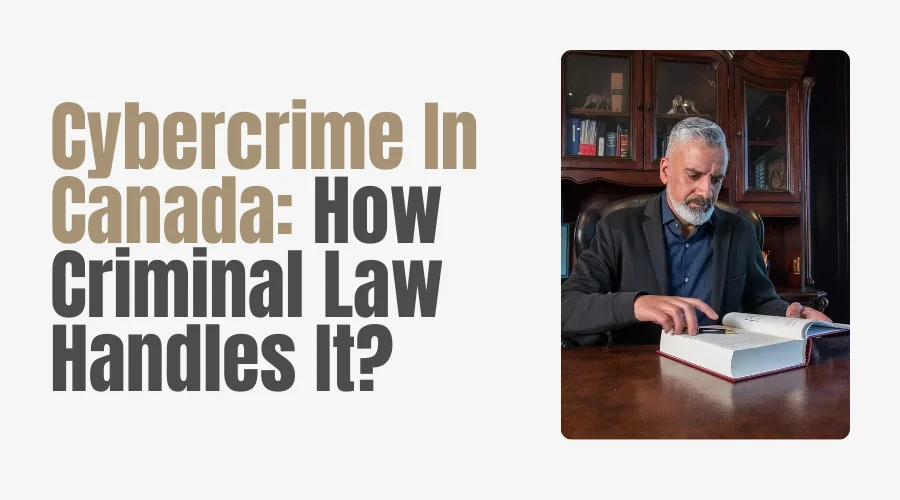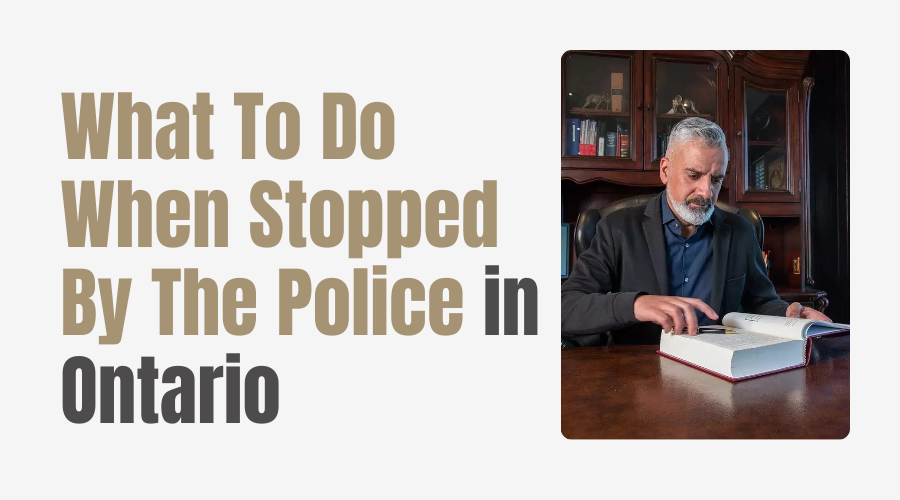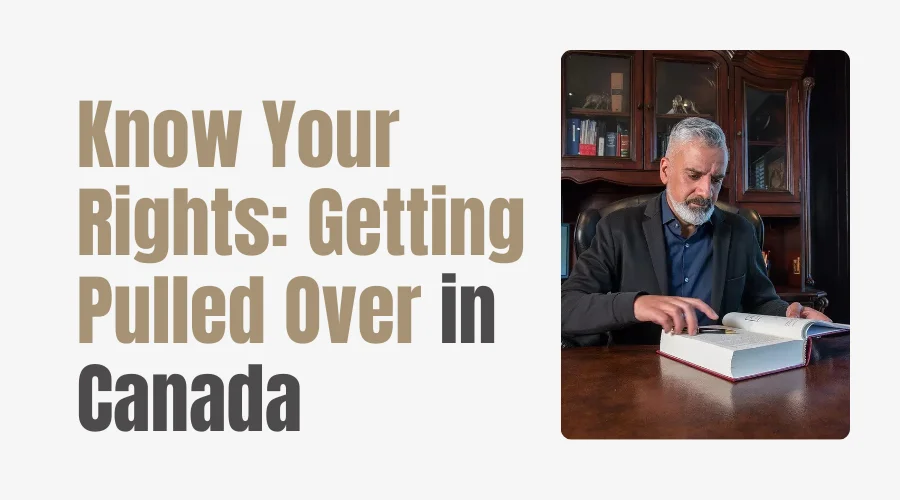Probation and Parole: Top 6 Differences to Understand

There is confusion among the general public regarding probation and parole. Many Canadians use them as interchangeable terms, but they are not one and the same.
So, if you want to learn more about probation and parole, keep reading to understand these two concepts in detail.
Probation and Parole in Canada: The Top 6 Differences to Know
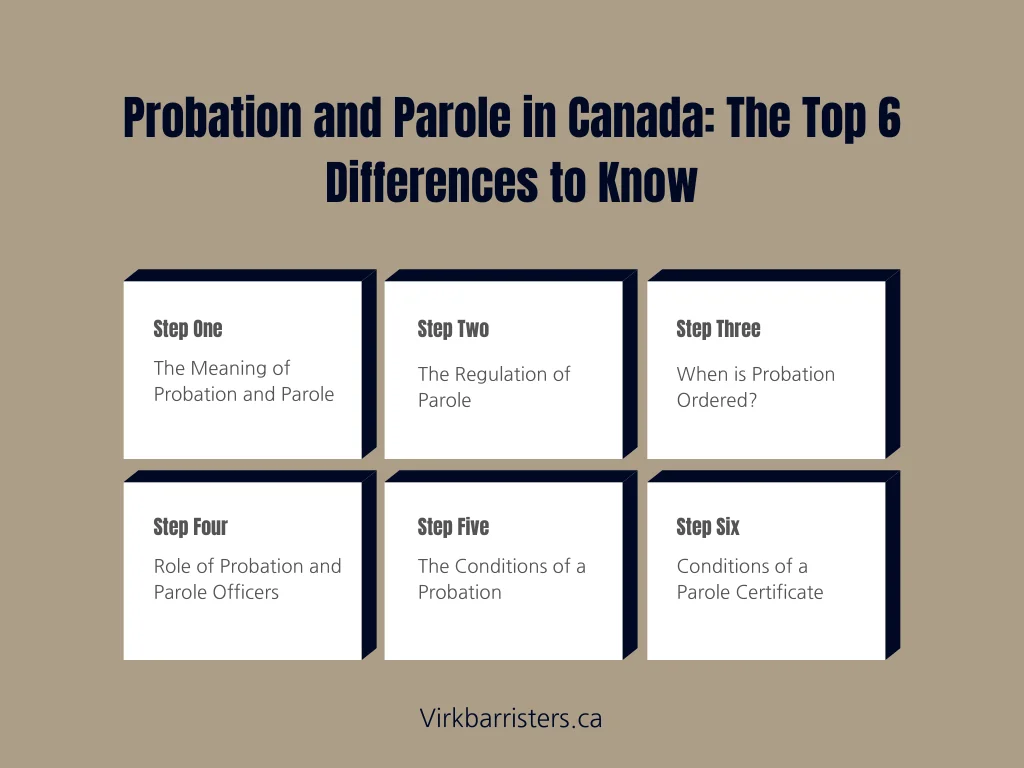
Let’s review the top differences between probation and parole to understand them better
Difference 1: The Meaning of Probation and Parole
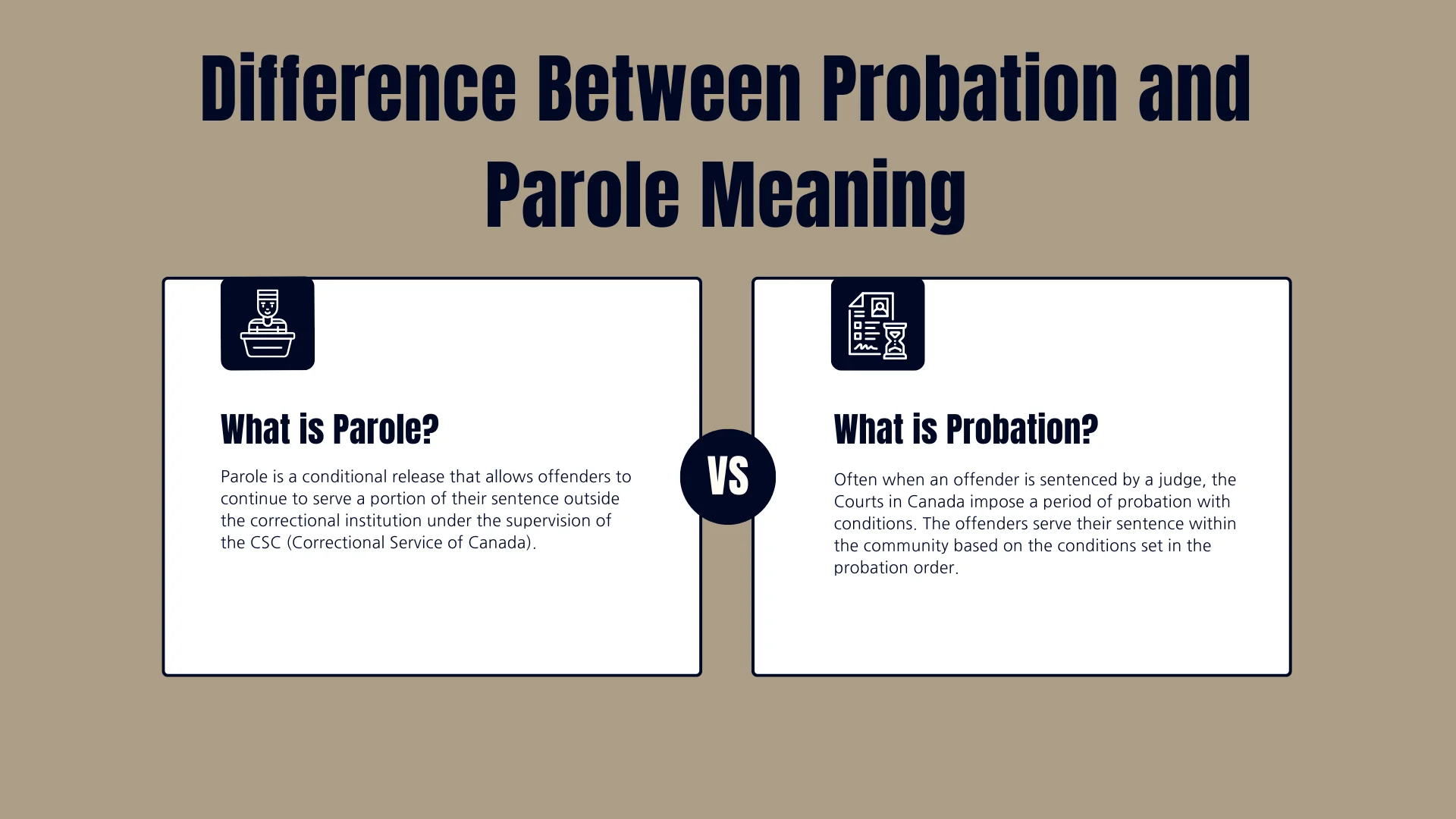
Meaning of Parole: What is Parole?
In Canada, parole is a conditional release that allows offenders to continue to serve a portion of their sentence outside the correctional institution under the supervision of the CSC (Correctional Service of Canada).
Please note that parole is subject to conditions by definition, as offenders don’t receive an unconditional release.
It is an opportunity for the offenders to be released from jail prior to the completion of their sentence, reintegrate into society and become contributing members of society, as long as they follow the conditions of the release.
The Ontario Parole Board makes parole decisions for offenders serving a sentence of two years minus one day. On the other hand, the Parole Board of Canada is responsible for offenders who have prison sentences of two years or longer.
Meaning of Probation: What is Probation?
Often when an offender is sentenced by a judge, the Courts in Canada impose a period of probation with conditions. The offenders serve their sentence within the community based on the conditions set in the probation order.
When talking about probation and parole, there are a few things you must know specifically about probation:
Conditional Discharge
Conditional Discharge takes place when the offender is not convicted but is found guilty of an offence and is discharged along with conditions set out in a probation order.
However, if the offender has been convicted of another offence during the probation term, then the court may decide to revoke the probation order and impose a sentence that could have been imposed when the probation order was created.
Suspended Sentence
This type of sentence registers a conviction, but the passing of the sentence is suspended. A suspended sentence is similar to the conditional discharge but with a criminal record.
Intermittent Sentence
The Court has the discretion to order a jail sentence up to 90 days in length which can be served intermittently, such as on the weekends. Please note that an intermittent sentence is accompanied by a probation order and is only applicable to cases when the probationer is not confined. If this type of sentence is followed by probation, then another probation order will be created.
Difference 2: The Regulation of Parole
We already established that the difference between probation and parole is that parole is a change in the way the sentence is served. It is important to note that parole is regulated under Canada’s Corrections and Conditional Release Act.
However, if you are living in a province with its own parole board, such as Ontario, where you will find the Ontario Parole Board, then it will fall under both federal and provincial jurisdiction.
Under Canada’s Corrections and Conditional Release Act, most of the offenders will only become eligible for parole after serving 1/3rd of the prison sentence or seven years, depending on which one is less.
There are also other rules that the Act sets out for parole eligibility, such as those serving a life sentence in Canada for murder.
For example, offenders serving a sentence for first-degree murder are only eligible for potential parole after serving twenty-five years.
It is up to the federal and provincial parole boards to decide whether they want to grant or deny parole to an offender. They also have a responsibility to prioritize public safety when making such decisions.
Some evaluations for parole include the following:
- The history of the criminal
- Potential conditions of the release
- Remorse from the offender
- Participation in rehabilitative programs
- Correctional institutional behavior
All of these things will be taken into account before deciding whether an offender should be granted or denied parole.
Difference 3: When is Probation Ordered?
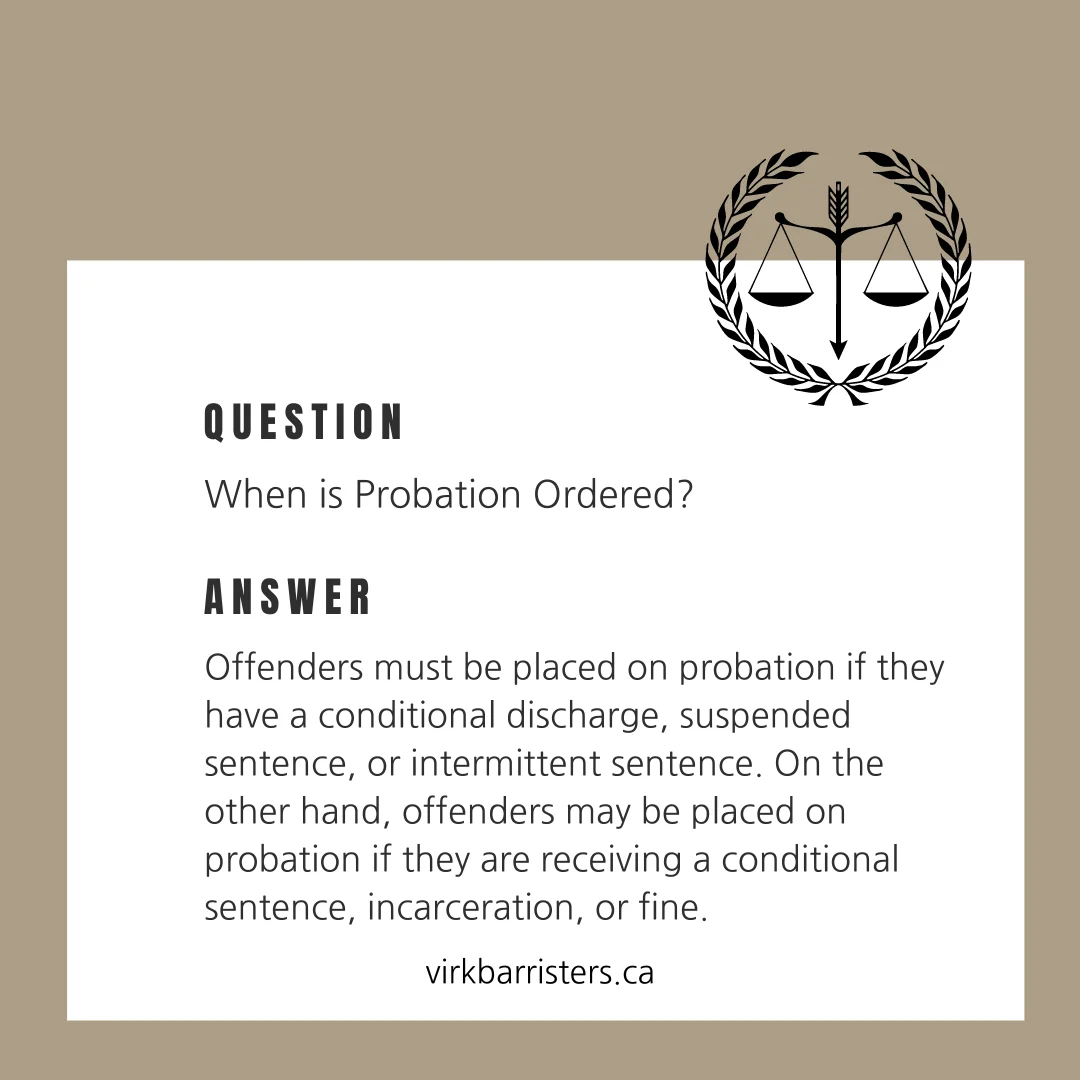
There are many ways probation can be ordered. These include suspended sentences, conditional discharge, or:
- Conditional sentence
- Intermittent sentence
- Imprisonment of a term not exceeding two years
- Fines
Offenders must be placed on probation if they have a conditional discharge, suspended sentence, or intermittent sentence. On the other hand, offenders may be placed on probation if they are receiving a conditional sentence, incarceration, or fine.
Finally, a probation order:
- Cannot remain in force for more than three years
- Cannot be made to run consecutive to another order
- Only ends on the expiry date of the order unless the court decides to terminate or revoke the order earlier. The court can also shorten the term of probation at any time
Difference 4: Role of Probation and Parole Officers
The role of probation and parole officers is slightly different, but their functions do overlap. These include the following:
Supervision Duties
The supervision duties of probation and parole officers include supervision of offenders serving part of their sentence in the community or who are on probation.
These officers provide the individuals with the direction and help they require by making sure to connect them with the available resources.
On the other hand, the probation and parole officers also ensure that the offenders are respecting the conditions of parole and probation, which can include the following:
- Following curfew limits
- Doing community work
- Staying in the same location
- Avoiding areas where you would find criminals
- Staying away from certain people or not communicating with them
- Undergoing treatment for alcohol or drug problems
- Not keeping any firearms
- Not consuming any alcohol
- Avoiding schoolyards
If any of these conditions are not followed, it is the duty of the probation and parole officer to report to the authorities in case of any breach. Then, they will take the relevant measures to rectify these issues.
Support and Prevention Duties
Probation and parole officers are also available to ensure the rehabilitation of the offenders and help them reintegrate into society so they don’t commit other crimes.
Officers can help offenders with:
- Finding housing
- Dealing with addictions
- Making new friends and connections
- Finding employment opportunities
Please note that every officer creates a personalized intervention plan for the individual to help them reintegrate in the best way. Firstly, they will eliminate the criminogenic needs of the offender and do this by:
- Understand the problems an offender is dealing with and why
- Providing the offender with counselling and referring them to organizations in the community that will be helpful to them
Assessment Duties
The duties of probation and parole officers include producing various reports. It is up to them to report the progress of the offenders and whether they are complying with the conditions of the release.
Officers evaluate the offenders from the beginning of the probation or parole. For example, if there is a high risk of the offender committing a crime again, they will have to meet with the officer more often.
Then, they must take the relevant steps to reduce the chances of returning to the same criminal lifestyle before they are convicted.
Difference 5: The Conditions of a Probation
The conditions of probation and parole differ. Here are some important probation conditions you must know about:
Reporting to the Probation Officer
Any offender on probation must report to the probation officer. The officer has the authority to supervise a person who has been on probation with a reporting condition.
It is up to the courts to outline the form and frequency of reporting. However, where the reporting condition says “report as directed” without a reporting schedule, a probation officer will need to complete an extensive assessment.
Doing this will determine the appropriate frequency and intervention of reporting based on the offender’s risk of committing another crime and the needs in areas linked with criminal conduct.
Different factors will also be taken into account to determine the type of intervention suitable for an offender, which can include the following:
- Safety of the victims and public
- Legal conditions and requirements of probation
- Circumstances of the offence and the risk of reoffending
- Motivation, need, and ability to benefit from rehabilitation services
- Suitability for different services and programs
Other Reasonable Conditions
Apart from reporting to the probation officer, an offender will also have to comply with other reasonable conditions. These conditions are there to guarantee that the accused is following good conduct and they don’t repeat the same offence or commit others.
On the other hand, these reasonable conditions of the probation need to:
- State with detail and precision what acts or conducts are prohibited, avoiding any wording which may be vague, uncertain, or contradictory
- Be relevant to the offence and rehabilitation of the offender
- Be enforceable in courts
These conditions need to be fulfilled to ensure proper carrying out of the probation for everyone’s safety.
Difference 6: Conditions of a Parole Certificate
Probation and parole officers are responsible for monitoring the offenders placed on provincial parole. It is the duty of the offenders to report to these officers.
A parole will allow the offender to transition back within the community through participating in various activities, such as schooling, employment, and addressing other needs such as treatment and counselling.
The parole certificate will only be given once the parole officer completes an extensive assessment to determine the needs of the offender and determine the requirements of reporting.
Can a Probation Officer Change Your Conditions?
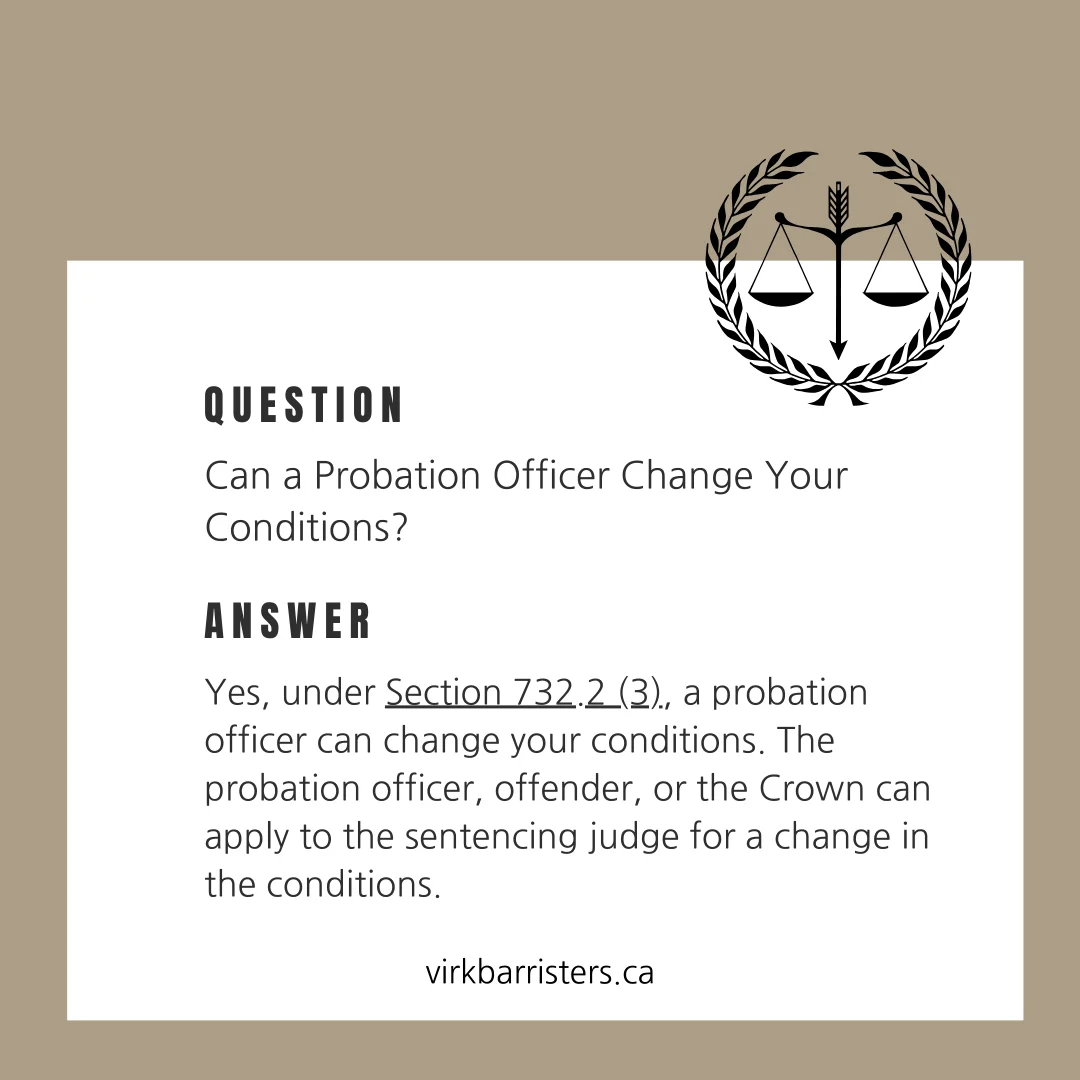
Yes, under Section 732.2 (3), a probation officer can change your conditions. The probation officer, offender, or the Crown can apply to the sentencing judge for a change in the conditions.
Such an application can be done in chambers. We recommend you get in touch with our criminal lawyer in Mississauga to understand these probation and parole changes in detail.
What Happens if You Breach Probation in Canada?
A breach of probation can be tried as an indictable offence with a maximum prison sentence of four years. On the other hand, it can also be tried as a summary conviction offence.
The latter has a maximum prison term of eighteen months, with a maximum fine of $5,000, or both. It is best not to breach probation in Canada, as it can worsen your situation.
Can You Travel While on Probation in Canada?
If you want to travel outside Canada, it is only possible once you have completed the sentence, which includes your probation and parole. On the other hand, if you want to travel within Canada, it is best to talk to your probation and parole officer.
They will let you know better what to do, and if you can travel within the country. Be sure not to do anything without their permission to ensure you are not violating any probation or parole rules.
FAQs
How does parole work in Canada?
Parole works when an offender applies for parole when they are eligible after a jail term of two years or more. Please note that the offender will not receive automatic release, as it is up to the Parole Board of Canada to decide whether they want to grant parole.
What is probation in Canada?
Probation is an alternative sentence to jail. It is a court order letting you know what to do or not do for a specified period of time and is known as a probation order.
Can you drink on parole in Canada?
When the Parole Board deems it necessary, they may impose special conditions, such as abstaining from the use of alcohol or drugs while on parole, which you must adhere to.
What does a parole officer do in Canada?
Parole officers work for the Canadian Government to manage the conditional release of federal offenders. The officers will recommend the placement of individuals in federal penitentiaries.
Final Thoughts
These are all the differences between probation and parole in Canada. Both are different, and the officers have different duties.
If you want to know more about probation and parole, be sure to get in touch with our criminal lawyer in Mississauga for more details.
Author Profile

- Mr. Suny Virk is a reputable criminal defence lawyer in Mississauga focusing primarily on criminal law matters of clients. Mr. Virk has been awarded with the Certificate of Merit Award in Advocacy. Now, he wants to impart his knowledge and wisdom to other people who may be struggling with the Canadian legal system to serve his community.
Latest entries
 UncategorizedMarch 25, 2025Cybercrime In Canada: How Criminal Law Handles Internet Offences
UncategorizedMarch 25, 2025Cybercrime In Canada: How Criminal Law Handles Internet Offences Legal AdviceMarch 7, 2025KNOW YOUR RIGHTS WHEN YOU ARE STOPPED BY THE POLICE
Legal AdviceMarch 7, 2025KNOW YOUR RIGHTS WHEN YOU ARE STOPPED BY THE POLICE Legal AdviceJanuary 24, 2025KNOW YOUR RIGHTS: 5 Things to Know When Getting Pulled Over by the Police
Legal AdviceJanuary 24, 2025KNOW YOUR RIGHTS: 5 Things to Know When Getting Pulled Over by the Police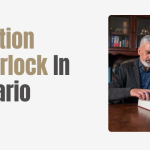 UncategorizedJanuary 11, 2025Ignition Interlock Ontario Program Explained by an Impaired Driving Lawyer in Ontario
UncategorizedJanuary 11, 2025Ignition Interlock Ontario Program Explained by an Impaired Driving Lawyer in Ontario
